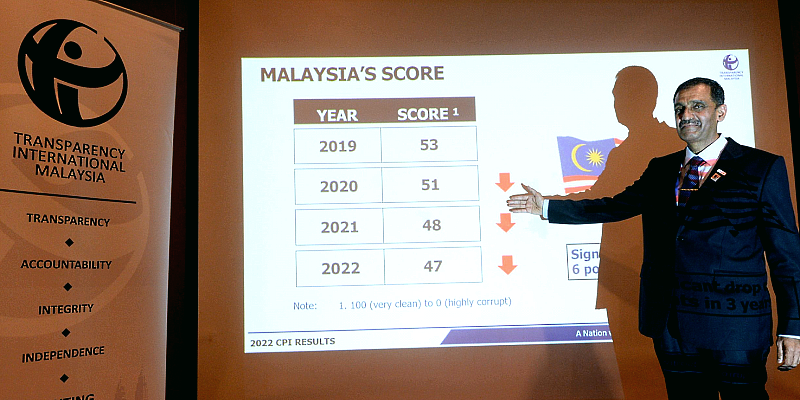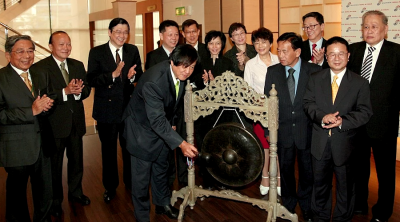Corruption is a national disgrace and corrupt officials are public enemies that will ruin our nation.
The 2022 Corruption Perception Index released by Transparency International showed that Malaysia was placed 61st among 180 countries and territories with a score of 47.
As a matter of fact, the country’s CPI has been sliding steadily from a score of 53 in 2019 to only 47 last year, the same level as in 2017 and 2018.
Transparency International has since 1995 been publishing their annual CPI rankings for the past 27 years, and Malaysia’s scores have ranged from a low of 43 in 2011 to 53 in 2019.
The CPI generally defines corruption as “abuse of entrusted power for private gain,” and is derived from the assessment conducted by businessmen, scholars and international analysts on the degree of corruption among the civil servants and politicians in specific countries within a certain year.
Since all the criteria used are standardized, we are in no position to question the fairness of TI’s evaluation.
We mustn’t think that “abuse of entrusted power for private gain” is not serious in this country.
For years, corruption in the country’s civil service has evolved into a “sub-culture” with corrupt government servants much more prevalent than clean and dutiful ones.
When low efficiency and lag attitude in civil service has developed into a norm, those trying to stay clean will find themselves hardly acceptable to the “accomplices of crime” in the system, leaving them with either of the only two options: to join in the game, or quit.
We are not trying to make a generalization here, but indeed systemic corruption of varying degrees among the country’s civil servants and politicians is very much evident, or else our CPI standing would not have gone that pathetic.
Neighboring Singapore scores 83 in the index and is placed fifth in the TI ranking. Aside from Singapore and New Zealand, all the other countries topping the table are Scandinavian and other developed European countries.
If you have ever lived in Singapore or Taiwan (ranked 26th), can you recall any incident of corruption or abuse of power involving a traffic cop or any official at public agency? Most probably not. But here in Malaysia, corruption has seeped into almost every aspect of the life of most Malaysians, as invasive as the air, sunlight and water!

Corruption has become a persistent phenomenon in Barisan Nasional, which has ruled the country for decades, or the number of parliamentary seats it won in a general election would not have plummeted from 133 in 2013 to only 30 last year.
If former PM Najib Razak could be thrown into prison for corruption, shouldn’t other senior Umno leaders be wary?
Both Pakatan and PN made “battling corruption” their predominant agenda in their 15th general election manifestos, and this potent weapon has completely thrashed BN. Apparently, majority of Malaysians abhor corruption!
After PH took over the federal administration under Tun Mahathir, the country’s CPI at one point rose to an all-time high of 53 in 2019. Unfortunately the uptrend was short-lived, and our CPI has since gone downhill, which has very much to do with political turmoil in the country.
Of course, the poor showing in 2022 shouldn’t be blamed on Anwar Ibrahim’s unity government, which was installed only in the final month of the year.
Among the proposals TI-M made to the Malaysian government include information transparency, reinforced anti-corruption programs at government departments, enactment of relevant anti-corruption laws, and reviewing of the MACC’s ability and execution power.
While we agree with the TI-M, we would like to also highlight the following:
Firstly, immediately after taking office, PM Anwar discovered that billions of ringgit worth of flood mitigation projects had been awarded by the previous administration without going through due tendering process. He consequently ruled that all government tenders must be open and transparent.
Secondly, “sunshine laws” must be enacted as soon as possible, including asset declaration by civil servants, political funding, as well as government information transparency.
Thirdly, declassification of classified documents (other than those entailing national security), especially those involving public interests and government contracts (such as procurement). With fewer documents being classified by the government, the less likely will civil servants become corrupt.
Fourthly, perhaps the government can emulate China in meting out severe punishments for corrupt officials, including life imprisonment and death, as this will have a deterrent effect on the others.
Fifthly, amend the Constitution to give the MACC more independence while the parliament can play its checks and balances role.
Corruption is a national disgrace and corrupt officials are public enemies that will ruin our nation. With our CPI sliding steadily in recent years, it is hoped that the unity government will firm up its resolve to battle corruption.
In addition to enacting new laws, the government should also mobilize all Malaysians to report cases of corruption involving government officials. We can only weed out corruption if every one of us is serious about it.
ADVERTISEMENT
ADVERTISEMENT


































